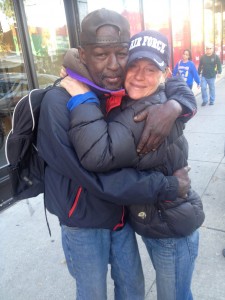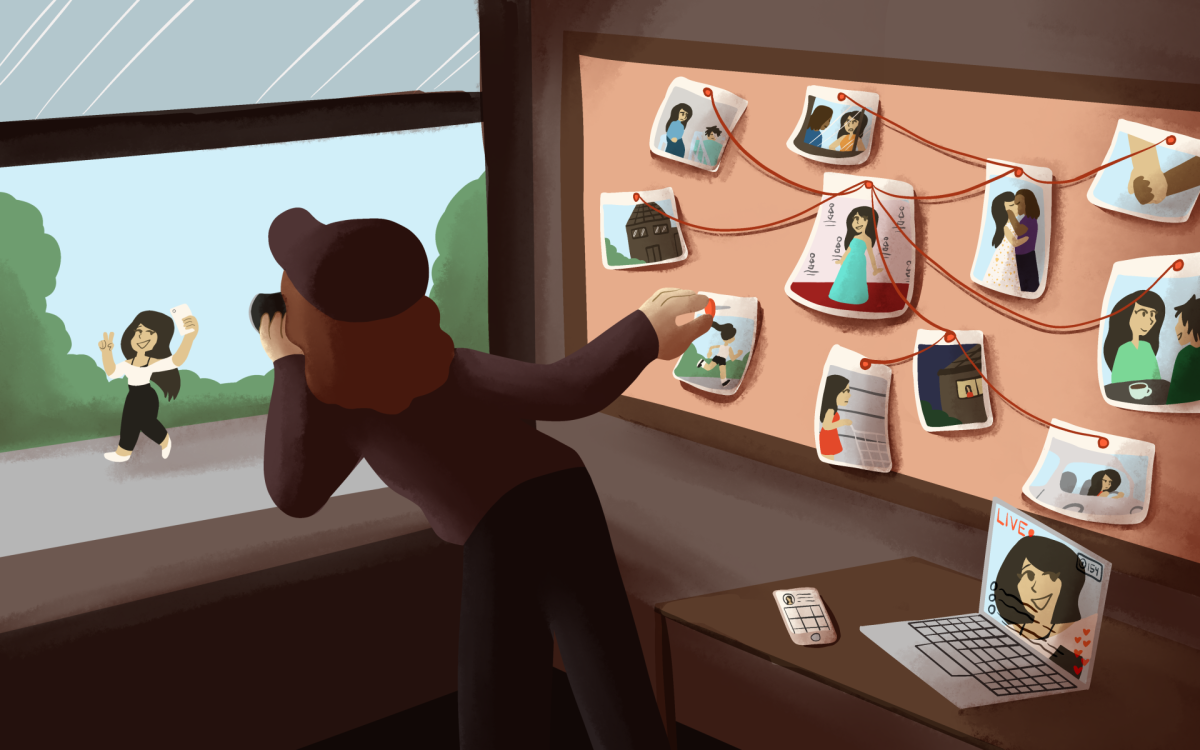
Heidi and Ronnie have been living on the unforgiving streets of Chicago for more than three years. Heidi, a single mother of three, found herself exhausted by the struggles of being the sole financial supporter of herself and her three girls.
One day at work, she was so exhausted that she took her first hit of crack cocaine. This mistake turned her already difficult life into a nightmare. She lost her children, her home and her self-respect. Ronnie found himself a victim of the same addiction and had been on the streets several years before meeting Heidi. They now face the cruelty of homelessness together, never knowing whether they are going to make it to the next day.
“From the minute I wake up, I’m hungry, thirsty, depressed and anxious. I’m wondering how I’m going to get breakfast or if I’ll ever get my kids back. There’s nowhere to eat today, no one to talk to, nowhere to go. We’re being dehumanized. We’re the first ones to help anyone out here, and no one gives a damn about us,” Heidi said.
People typically view the homeless as unworthy of something as simple as a friendly greeting or smile. We walk past them on a daily basis, especially in Chicago, and pretend they only exist as another obstacle of our rushed morning commute. We fail to realize that they are humans, too. We cannot continue to step on the homeless to get on top. They deserve the opportunity to become an active member of society, and they have consistently been denied that.
According to the Universal Declaration of Human Rights, “everyone has the right to a standard of living adequate for the health and well-being of himself and of his family, including food, clothing, housing and medical care and necessary social services, and the right to security in the event of unemployment,” all of which are absent in the life of the average homeless person. The notion that the homeless are completely at fault for their circumstances allows these human rights violations to grow in severity.
“I want to work for everything. I’m not lazy. I’ve applied for jobs but I don’t have a shower, food, or clothes. Who the hell is going to hire me? How can I get a job when I’m sleeping in an alley? I want to be good,” Heidi said.
Current approaches to homelessness relief, rooted in the assumption that the poor are intrinsically inferior, treat the effects and neglects the causes. Relying solely on temporary solutions, such as shelters and food banks, leaves the problem unsolved. Although these relief efforts are vital, the focus needs to be shifted to include solutions such as permanent housing and employment opportunities.
“The shelters here, they have limited openings, and these people can stay there as long as they want. I want a job and counseling. I want to move forward. I want to make it back to society, not sit there with other people who got their life turned upside down by crack,” Heidi said.

According to the Continuum of Care Programs (COC), as of 2013 there are 610,042 Americans experiencing homelessness on any given night. This figure remains a constant, proving that the current “solutions” to homelessness —especially those resembling the structure of homeless shelters — are ineffective.
To understand the failures of the current approach to homelessness relief, we must first identify the root causes that are typically mislabeled as “laziness.” Unjust drug policy, wealth inequality, limited living wage jobs and the cycle of generational poverty are just a few of the root causes. The COC cited that out of the 610,042 homeless, 133,230 are homeless as a result of substance abuse, 124,152 as a result of mental illness and 63,836 as a result of domestic violence.
According to the National Coalition for the Homeless, substance abusers living in extreme conditions of poverty are fairly likely to lose their home. Treatment for substance abuse is difficult to come by for the homeless and many homeless substance abusers begin their battle with addiction on the streets with nowhere to turn. This cycle of abuse and the failure to address it stunts any progress that can be made in defeating homelessness.
The U.S. prison system only continues to exacerbate this issue, using our taxpayer dollars to incarcerate and re-incarcerate substance abusers and the mentally ill. The Bureau of Justice Statistics cited that approximately 64 percent of inmates are affected by some type of mental illness. These “offenders,” both mentally ill and substance abusers, are jailed for short periods of time, thrown back onto the street, and then jailed again for a similar offense. According to a study conducted by the Department of Justice, it costs around $15 billion per year to house the mentally ill people in our prisons. Focusing on treatment rather than incarceration could exponentially reduce the amount of taxpayer money going to fund prisons. Investing taxpayer money in drug rehabilitation and mental health facilities solves the problem at its core, effectively stopping the vicious cycle that forced these people to remain homeless.
Make no mistake, the neglect to sufficiently aid the homeless is a human rights issue. Paul Farmer, founder of Partners in Health, an organization that helps to provide the poor with proper health care, claimed that the key to social justice is seeing, “the conditions of the poor not only as unacceptable, but as the result of structural violence that is human-made.” We must identify our contributions to the growth of homelessness and find a way to reverse them. The longer we allow people like Heidi and Ronnie to suffer as a result of our carelessness, the worse the problem will get.
Understand that the homeless are not victims of misfortune, but rather victims of the same structural violence that threatens all of us on a daily basis. Addressing the issues at the root of homelessness takes time and effort, but that does not mean that we can remain idle while changes to the structures of society are in progress. If you’re wondering where to start, begin with yourself. Treat the homeless with the same respect you would have for anyone else; buy them a warm meal, engage them in conversation, let them know they are not alone. Challenge your beliefs, and remember that small acts of kindness make a difference.
Solving the issue of homelessness is no easy feat, but if we continue living in a society absent of action, the issue will persist for eternity. We must stand up for what we believe in, and actively resist supporting the entities at the root of the problem. We must stop allowing the fear of acting against our oppressors to paralyze us. We must let go of our preconceived notion and treat the homeless with the respect they deserve. This is not just an issue about homelessness, this is about human rights, too. If you think that every human being should have equal opportunity, use your voice to stand up for those who do not have one.







